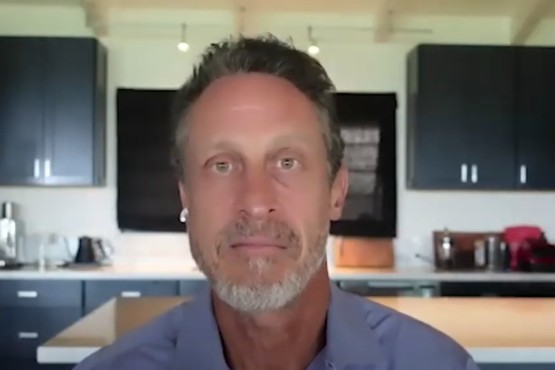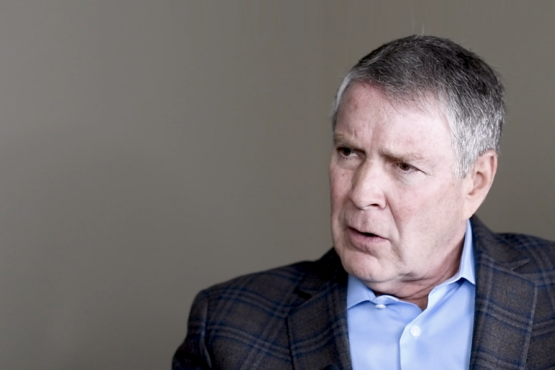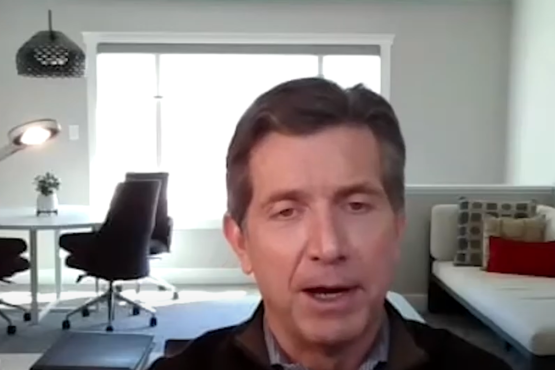You are about to hear a discussion I’m having on the COVID-19 pandemic with my good friend Dr. Marty Makary, New York Times bestselling author, John Hopkins surgeon and brilliant researcher; and Dr. Larry Van Horn, a healthcare economist, professor at the Vanderbilt Owen School of Management and advisor to the White House.
We are presenting virtually to our Nashville Health Care Council Fellows Class, a group of the brightest rising executives and leaders in the healthcare space.
We are taping on Friday, April 10th. This is a rapidly evolving crisis, changing day by day. So, please continue to follow the latest recommendations by the CDC.
Marty Makary: Why don’t we at wartime allow people to sign up for these trials when we know that generally vaccines are safe. Right? Each year we introduce a new flu vaccine. The track record of vaccines is entirely different from the track record of new chemotherapy agents. Yet we use the same protocols.
Bill Frist: Today on A Second Opinion we bring you our latest special episode in our continuing series of providing the most up to date, real time coverage on the 2019 novel coronavirus. You’re about to hear a discussion I’m having of the COVID-19 pandemic with my good friend, Dr. Marty Makary, New York Times bestselling author, Johns Hopkins surgeon and brilliant researcher. And Dr. Larry Van Horn, a healthcare economist professor at the Vanderbilt Owen School of Management and advisor to the White House. We are presenting virtually to our Nashville Healthcare Council fellows class, a group of the brightest rising executives and leaders in the healthcare space. We are taping on Friday, April 10th. This is a rapidly evolving crisis changing day to day so please continue to follow the latest recommendations by the CDC. I’m your host, Senator Bill Frist. Welcome to A Second Opinion.
Larry Van Horn: We’re really blessed and lucky enough to have a great friend of Bill and mine join us here, Dr. Marty Makary, New York Times best selling author, Johns Hopkins surgeon, professor of health policy. And given that I can’t turn on my TV these days without seeing Marty with the tagline, Fox News contributor, Marty is here with us. You all got a copy of Marty’s book, both of his books from the Healthcare Council at the start of our program. And I texted Marty this morning and said, hey, can you squeeze in a drop-in cameo to give us some color commentary on some things that people aren’t talking about? And Marty was willing to do so. And Marty, appreciate you being here for a little bit with us this afternoon.
Marty Makary: Great to be with you guys.
Larry Van Horn: I’m going to tee up a couple things, and part things I’ve heard you have mentioned in some of your segments in the last couple days that aren’t probably getting as much attention. And I was struck last night when you were on Tucker Carlson talking about antiviral testing, or antibody testing, excuse me, and the role of the FDA. And you had some strong commentary around that and maybe we’ll start there.
Marty Makary: Okay, great, Larry. Well first of all, great to be with you guys. And as I look at all your beautiful backgrounds here it reminds me, again, the ancient question that Dr. Frist has planted in my mind. And that is, why don’t we all live in Nashville? It’s another temptation here. So yeah, the issue of our testing has been the subject, if you watch the BBC of Europe, almost mocking our process of how we rolled out the testing. And it’s really unfortunate because it came down to an incident where we have decided as a country that if we want to enact an emergency use authorization for testing units, that individuals have to apply for that emergency use authorization. So ironically, the authorization was designed to expedite testing, but the process, even though it sounded simple, a request for authorization, was made by a Dr. [Grenninger] from the University of Washington where they had some of the first cases.
Marty Makary: Now, if you know anything about testing, the genetic sequence was published by one of the Chinese surgeons early in this pandemic. And it was online and published in a journal as well. And therefore anybody could take a piece of suspected virus from any swab of anybody in the world, run a sequence and see if it matched. And in fact, that’s what most of the world did. But given this authorization that was created, ironically intended to facilitate things, Dr. Grenninger from the University of Washington back in January submitted his application. And when he didn’t hear anything, was told you’d have to send a paper copy in addition to the electronic submission. And so you need to print out your application and send it by snail mail, which some of you may not know what that is, but you can look it up. And include a CD-ROM with the files burned on it.
Marty Makary: No, I don’t I have a CD-ROM, I don’t know if any of you have a CD-ROM. But he went through this long process, and unfortunately we lost a critical six weeks just in that process. Eventually by the time this thing had come to the limelight, obviously then all of the weight of heaven and earth was put into trying to expedite things. But basically the FDA put all their eggs in one basket and they authorized only one laboratory to develop a COVID test. And that one laboratory was the CDC. And unfortunately the testing system that they sent out was essentially recalled. So it’s unfortunate.
Marty Makary: Now there’s no silver bullet for this pandemic, in my opinion. It’s not testing, it’s not hydroxychloroquine. Maybe all of those things contribute to us beating this thing. But probably one of the great silver linings is that the good hygiene and social distancing that physicians have talked about for centuries is now no longer treated like a recommendation to follow the speed limit. But people are taking it seriously and we’ll probably see thousands of lives every flu season from here on out, at least during this generation because of the positive education.
Marty Makary: But it’s a great irony how this testing system had rolled out. As of last Wednesday the FDA approved one and their first and only antibody testing system. And that was a company called Cellex, which I discovered yesterday is essentially a company with big Chinese operations and probably a storefront in Northern North Carolina. I went to their website, it’s loaded with typos including the word headquarters and innovative. And it’s written as if somebody who doesn’t speak English as their first language wrote the website. So ironically that got the first FDA approval last week for the antibody test. But many of us are hopeful that the antibody test can help green light people to get back to work, because I think everybody’s getting stir crazy right now. Although not in Nashville, I’m sure.
Bill Frist: Marty, what do you think about the accumulation of data? HCA a few days ago announced a partnership with Google and we have today Apple and Google coming out. And it is kind of strange that we don’t have any sort of accumulation of data for analysis in real time, because things are moving so fast and the virus changes. We learn about it, we learn about it’s transmissibility every day. You and I are used to doing peer reviewed papers and the like, and this has made it so much quicker. Do we see anything on the horizon that is promising in terms of the accumulation of data from a surveillance standpoint, also superimposed with mobility, superimposed with utilization [inaudible] of like, do you see it coming or not?
Marty Makary: I think it’s key to our path to get back to work to identify those at risk. Those who have had the antibody. And maybe even those who don’t have the antibody but had the infection. So I love the idea. I hope we can see that come to fruition. I haven’t seen or heard anything at a large scale in the United States beyond some ideas, although I may not be in the loop. But overseas we have seen countries mobilize to create certificates, both paper and electronic certificates that you’ve had the infection and that may mean you can go back to work first once the peaks are hit. And China has even instituted an app so that you get essentially a green light which allows you to travel. If you think of going through the TSA that’s required and allows you to go back to work as well.
Bill Frist: Great. Larry?
Larry Van Horn: Yeah. Did you see the news story out this morning, Marty, about Apple and Google teaming up on coronavirus contact tracing where they are going to notify you on an opt-in basis if you have come in contact with someone with the coronavirus without having to share other’s location information.
Marty Makary: Seems like a great idea. I mean, that’s the kind of thing that we can outsmart when it comes to battling this virus.
Bill Frist: It’s good to introduce. And we hear it already, the privacy hawks in the country and the tension between privacy and data in times of emergency on pandemics. It’s something we should have thought through from a policy level long ago. And proposals have been on the table. And I actually, I tried that back in 2005. To have that battle will either slow things down or put up barriers unnecessarily is, I think, to the real harm to the American people. But it’s going to come, it’s going to come very quickly.
Bill Frist: And of course data today, we can be identified, but the privacy option will probably slow a lot of it down.
Marty Makary: And if I could just add to that Dr. Frist. I would also say that along those lines our protocols to introduce new drugs and vaccines have been basically unprepared for this time, just like our privacy rules have, were never designed. These are peacetime protocols that were written for phase one trials, and now we’re trying to do them at war. If you think about back in the days when penicillin was discovered, a scientist noticed that the fungus was growing over the Petri dish and had killed all the bacteria. And then his daughter got a terrible infection, so he had her eat the fungus and it cured her. And then immediately after that World War I came around where soldiers were coming in with infections. And if it was between dying or trying this new medication, which was penicillin, they chose the medication. And so they say necessity is the mother of invention.
Marty Makary: You wonder if we need to redesign all these phase one protocols where one person gets the medication at a low dose and then we follow the patient for three weeks, then three people get it, then we follow them for three weeks and three months later issue a report. That’s what we’re dealing with now with some of these new-
Bill Frist: And Marty, while you’re on that, so the vaccines, it’s hard for people to understand. Vaccine, when on television we hear it’s going to take a year. When Fauci, who’s doing a good job. I think a pretty effective job. When he says a year to 18 months, if we have a Manhattan Project, or if we focused the private sector and the public sector on vaccine development, and this was the same discussion we had back with H1N1, after MERS, after SARS. It goes back to HIV. If we basically said we had a Manhattan Project to shorten that time from 18 months to three months. Because a lot of it is the testing, the manufacture, the testing is really, it all comes together. But could we shorten that time if we said we’re going to do it, putting the very best of science on it?
Marty Makary: I think that’s the key. You know the second US vaccine, there’s six vaccine trials in the world right now. The second US vaccine trial just started this week and it’s in Kansas City, a company called Inovio. The first vaccine is a basically an NIH sponsored vaccine through Moderna. But the second vaccine, they got 40 volunteers instantly. And if people are willing, the Texas Lieutenant Governor suggested he’s willing to die for the economy. Well, he’s probably ready to sign up for the vaccine trial if it’s that meaningful for the country.
Marty Makary: Why don’t we at war time allow people to sign up for these trials when we know that generally vaccines are safe. Right? Each year we introduce a new flu vaccine. The track record of vaccines is entirely different from the track record of new chemotherapy agents. Yet we use the same protocols.
Larry Van Horn: Yeah, very good. I mean, Marty, I want to be sensitive to your… You’ve got a hard stop here in about four minutes, so I do want to make sure that I let you get onto your next thing, you’ve been very kind to join us. Mark, you had a question for Marty, I believe.
Mark: More just a comment about tracking in applications. We actually created a tool at partners that all staff have to basically do a COVID pass every day and self attest that they’re symptom free before they can actually come in. And then they flash it like… It was when you brought up the app in China to prove that they’re COVID free. This is kind of the rudimentary version for our sites where you have to self attest that you aren’t having any symptoms before you’re able to come in. And you just flash it like the jet blue ticket. And if you don’t have a green pass, you can’t go into the facility, you can’t get a face mask. And we’ve actually screened about 25,000 people every day. We’ve been doing this for about two and a half weeks and screen about 500 people that are positive for symptoms and then they get sent to OC Health for further evaluation. So we’re trying to use technology to help triage in that way as much as we can now.
Larry Van Horn: Very good.
Marty Makary: Mark, that’s sounds terrific.
Larry Van Horn: Marty, you gave me another couple minutes, I appreciate you. People are asking you lots of questions and they’re typically directed in terms what they want you to talk about. What I would be interested in is, what do you think people aren’t framing right? Or what are the questions that aren’t being asked that you think people need to be focused on?
Marty Makary: Well, I think there are probably two things where if I could recalibrate the expectations of the public, these are the two things I would do it for. Number one is this will probably not be completely behind us in June. It may be behind us enough to get back to work and full steam ahead, but when cases come up in September, even though the burden of those cases may be far less in the fall than the regular flu season, are we going to have mass hysteria in the media? And that’s why I try to let folks know, especially business leaders, that when you start seeing cases pop up in September, that’s okay. That is probably expected. And this is probably more of a chronic disease, and we may be with this for a year or two. Now let’s hope not.
Marty Makary: And the second thing is, I think especially with the media pile on, we’d like to get excited about some kind of hope. And it’s not just with the treatment for COVID. Look at the media coverage of cancer. Every day for the last 20 years there’s probably been a news story that we’re on the brink of curing cancer. Well guess what? It’s been around for centuries, it’ll be around for centuries longer. I’m not a virologist, I’m a surgeon interested in public health. But what I am really curious about in talking to different doctors out there is, what is going to end up being, if we beat this thing with a therapeutic, what is it going to be? Is it going to be an antiviral therapy? A vaccine therapy? Or a cytokine blockage therapy? That is a way to block that cytokine storm that damages the lung tissue in late stages of the infection.
Larry Van Horn: Marty, are you guys at Hopkins at all talking about how we are going to restart, and what does that that look like? And when are you going to do it? Because we really do need to think about a path out in the restart, and how we are going to navigate that in a way that patients feel comfortable and safe reengaging with our healthcare delivery system. Any thoughts on that?
Marty Makary: Well, if there’s ever been a real world validation of our original study from four years ago-
Larry Van Horn: I know, isn’t it true. It is.
Marty Makary: Yeah. I mean, for those who may not be aware, our study asked US physicians what percent of medical care is unnecessary. And the overwhelming response in 2,000 US physicians was 21% on average of all medical care is unnecessary. So the question is, how are we going to manage the backlogged patients? And it’s probably not too early to start thinking about Saturday operating room hours and evening shifts. And keeping those endoscopy suites open longer because there’s a massive backlog of patients right now. And we need to think about it. It’s also interesting for the financial piece of this, we’re talking about mega dollars going out to hospitals. And the question is, what is the hit? Is the hit, that lost revenue from elective care and the services that are on backlog, is there going to be a makeup period where they can get those procedures done in overdrive?
Marty Makary: What is the billing for critical care look like? So that’s a big unknown right now. And if you had to ask me, should we under fund or over fund US hospitals, I would say, it’s better to over fund right now. I just want to make sure the money’s going to hospitals that need it most. Some have been on the brink of collapse before COVID-19. And we just probably should be smart. There is an announcement yesterday that there will be a surprise billing condition on the money going out, and that was just announced yesterday.
Larry Van Horn: Marty, you believe that the elective volume that hasn’t been delivered will come back. It isn’t permanently gone. And you think there will be this corresponding demand peak and surge when all this stuff comes back.
Marty Makary: There’s definitely a mass backlog of prostatectomies and mammograms and colonoscopies, and patients who’ve skipped their infusion therapies waiting to get going on the day they get green-lighted. So the question is, what proportion of patients are going to get care after June or July when we get the green light? And are hospitals going to start accommodating them during the decline of the peak? We saw Washington state close one of their field hospitals today because it was essentially never used. Are they going to start seeing capacity where they can start doing cases maybe in a different building or on a different floor, or somehow containing or cohorting people without the infection?
Larry Van Horn: Very good. Well Marty, you’ve been very generous for your time, Bill and I greatly appreciate it. It’s always good to see you. Thank you for being here my friend.
Marty Makary: Thanks for having me. Good to see [crosstalk 00:19:51]-
Bill Frist: Marty, thank you. Good to see [crosstalk] you.
Marty Makary: Likewise.
Bill Frist: Thank you to the Nashville Healthcare Council fellows program for hosting this discussion. And thank you for tuning in to this special broadcast of A Second Opinion. As developments occur, we will continue to keep you up to date with episodes from trusted sources coming right to your phone. Make sure to subscribe to this podcast to get the most current information on the coronavirus pandemic. And be sure to listen to our regular Monday broadcast.
Bill Frist: This week we released the final episode in our three part healthcare innovation series. We’re joined by Rajeev Singh, the CEO of Accolade, a market leading personalized advocacy and population health solution for employers, health plans, and health systems.
Bill Frist: This episode of A Second Opinion was produced by Todd Schlosser, the Motors Creative Group and Snapshot Interactive. You can subscribe to A Second Opinion on Apple podcasts, Spotify, or wherever you are listening right now. You can also watch our interviews on YouTube and on our website. And be sure to rate and review A Second Opinion so we can continue to bring you great content. You can get more information about the show, it’s guest and sponsors as asecondopinionpodcast.com. That’s, asecondopinionpodcast.com. A Second Opinion broadcast from Nashville, Tennessee, the nation’s Silicon Valley of health services where we engage at the intersection of policy, medicine, and innovation.





